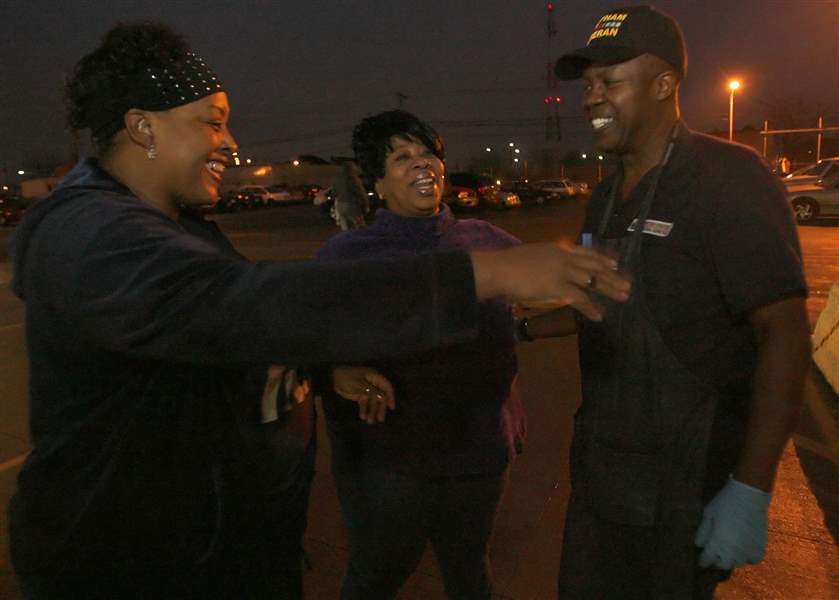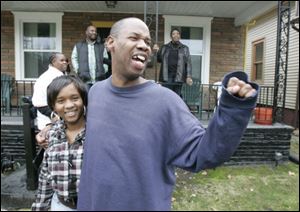
Friends, family greet Toledo man after 13 years behind bars
11/24/2009
Laverne Knighten, center, with family friend Jeanine Stewart, tells Willie Knighten, Sr., that their son will be freed from prison.
The Blade/Amy E. Voigt
Buy This Image
Surrounded by family and with a continuous stream of well-wishers stopping by his parents' Hamilton Street home, Willie Knighten spent his first few hours as a free man making up for lost time.
Released from Allen Correctional Institution Tuesday morning after spending nearly 13 years behind bars, Knighten was greeted by a crowd of cheering, and sometimes tearful, friends and family.
Knighten, convicted of murder in a 1996 drive-by shooting in Toledo, was released after Gov. Ted Strickland commuted his 18 years to life sentence on Monday. The governor cited discussions with the late Judge William Skow on Knighten's behalf as the primary factor in his decision.
Tuesday, with his arm around his 16-year-old daughter, Whitney, Knighten thanked Judge Skow calling him "my biggest advocate outside my family."
"I'm thankful to be here," he said. "It's been a long time coming but I have no complaints."
Knighten, now 37, was convicted on June 5, 1997, of murder and attempted murder, both with gun specifications. He was found guilty of the death of Irving Turner, 29, who was shot in the head in the 1100 block of Fernwood Avenue, and the wounding of Adaris Welch, who was wounded in the shoulder as he ran from the area.
Judge Skow issued the verdicts after a trial to the bench.
Prior to his death in June, the judge wrote a letter to the Ohio Parole Board saying he had erred in sending Knighten to prison. He said that there were significant errors made during Knighten's trial and he criticized the police investigation.
Knighten's parents, Willie, Sr., and Lavern, as well as his daughter drove to Lima Tuesday to bring him home to Toledo. Knighten said he hopes to return to school to earn a degree and "get a job."

WIllie Knighten Jr., with his daughter Whitney Knighten, 17, waves to a well wisher from his Toledo home.
From previous issues of The Blade and toledoblade.com
Toledo man gets clemency in '96 slaying
Judge Skow had spoken on behalf of inmate
By JIM PROVANCE
and ERICA BLAKE
BLADE STAFF WRITERS
COLUMBUS - Laverne Knighten will sit down with her son for a holiday meal this week for the first time in more than 12 years after Gov. Ted Strickland Monday commuted his prison sentence.
"My son will be home for Thanksgiving. I'm so happy," said Mrs. Knighten of North Toledo, mother of Willie Knighten, Jr. "It's just the family. We had already planned that already. They're all going to be at my house."
Knighten, convicted of murder in a 1996 drive-by shooting in Toledo, will walk out of a Lima state prison a free man today.
In making his decision, the governor cited discussions with the late Judge William Skow on Knighten's behalf as the primary factor in his decision. The commutation to time already served made Knighten eligible for immediate release from Allen Correctional Institution on what was previously a sentence of 18 years to life.
"My staff actually talked with [Judge Skow] before his death and before he wrote the letter," Mr. Strickland said. "That letter and conversation were of great importance. I almost certainly would not have taken this action without knowing that the judge who heard the evidence and imposed the original sentence felt that there had been an erroneous decision on his part."
Knighten, now 37, was convicted on June 5, 1997, of murder and attempted murder, both with gun specifications, in the fatal shooting of Irving Turner, 29, and the wounding of Adaris Welch. Mr. Turner was shot in the head in the

Laverne Knighten, center, with family friend Jeanine Stewart, tells Willie Knighten, Sr., that their son will be freed from prison.
1100 block of Fernwood Avenue. Mr. Welch was shot in the shoulder as he fled.
Although Mr. Strickland indicated he believes Knighten was likely not the gunman, his clemency decision does not erase the conviction. Without commutation, the earliest Knighten could have been considered for parole was October of next year. Judge Skow, while on Lucas County Common Pleas Court, convicted and sentenced Knighten after he waived his right to a jury trial.
"Over the past years, I have become increasingly persuaded that my findings were erroneous and that - in fact - it is more likely than not that Willie Knighten was innocent of the underlying charges," Judge Skow wrote earlier this year to the Ohio Parole Board. "This case has weighed heavily on my mind ever since."
That letter made the difference. Of 296 clemency applications decided yesterday, 218 were denied. Sixty-eight resulted in pardons and 10 led to sentence commutations. Knighten, who had been involved in gang activity, was the only inmate whose decision will lead to immediate freedom without parole.
All of the applications decided yesterday had been pending since at least 2007. Sixty-three were holdovers from Gov. Bob Taft's administration. Mr. Strickland, a former prison psychologist, had been criticized for the backlog.
"If I had not taken these responses as seriously as I have, perhaps things could have been done more quickly," Mr. Strickland said. "Having worked in the prison system and understanding something about crime and justice, I believe it is incumbent upon me and my staff to spend whatever time it takes to make sure we collect as much information as possible from as many sources as possible."
A parole release consideration occurs when an offender becomes statutorily eligible for release based on his sentence, unlike a clemency request, which can be granted only by the governor.
In a clemency situation, the offender's sentence is not considered and it is pursued only if the offender submits an application.
Among the three forms of clemency: a commutation, in which the sentence is reduced; a pardon, in which an offender's sentence is forgiven, or a reprieve, which is a temporary delay of the sentence. A reprieve is applicable only in death-penalty sentences.
In each case, the governor relies on a recommendation from the Ohio Parole Board. The Democratic governor said the evidence favoring commutation in Knighten's case "would certainly have not been as compelling" without Judge Skow's letter.
"The parole board had originally denied his request, and the compelling reason that I am granting this commutation is because the individual who heard the evidence and made the original decision regarding the sentence communicated to us directly and convincingly that an error had been made," the governor said.
In an August letter to The Blade, Knighten again professed his innocence and expressed gratitude to Judge Skow. He wrote that he sought commutation because he is "100 percent innocent" and said Ohio doesn't have clemency for innocent people.
"So this is why I chose to have my sentenced commuted," he wrote. "Also, this way the state will not have to admit any wrongdoing. I just want my freedom."
Knighten's mother had visited Judge Skow in his chambers with the victim's mother, Addie Turner, to express their belief that Knighten was not the killer. Ms. Turner could not be reached for comment yesterday.
Judge Skow, who subsequently moved to the 6th Distict Court of Appeals, died on June 21 before seeing the parole board unanimously reverse itself and recommend commutation.
"There is no single fact or circumstance to which I can point which exonerates Willie," Judge Skow wrote. "Rather, it is an accumulation of facts and anomalies that have led me to this belief, buttressed by the intensity of his protestations."
The judge had previously determined that witnesses who claimed Knighten was at a party with them at the time of the shooting were not credible. But later Judge Skow wrote that Knighten was represented by a young attorney who "was in over his head" and who made several mistakes, including failing to properly challenge the testimony of three eyewitnesses.
Assistant County Prosecutor J. Christopher Anderson, who tried the case, acknowledged there was no scientific evidence to corroborate the statements of the eyewitnesses. But he noted Judge Skow at the time believed the witnesses over the defense alibi.
David Mullin, a retired Toledo police detective who served as lead investigator, urged the governor via a letter to deny the request.
"An 'eyewitness' presented as a prosecution witness described in detail the entire event as it occurred and positively identified Knighten as the shooter," Mr. Mullin wrote. "… It took a considerable amount of persuasion to convince her to testify due to death threats made towards her. It must be understood that Knighten was not only a member of a 'street gang' but also the president and 'enforcer,' who allegedly killed other persons while in that role."
Contact Jim Provance at:
jprovance@theblade.com
or 614-221-0496.